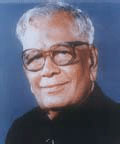|

Born on December 4, 1910
in the village of Rajamadam, Thanjavur District, Tamil Nadu,
Shri Venkataraman married Smt Janaki Venkataraman in the
year 1938. They have three daughters.
EDUCATION:
Educated locally and in the city of Madras, Shri Venkataraman
obtained his Master Degree in Economics from Madras University.
He later qualified in Law from the Law College, Madras.
LAW:
Shri Venkataraman was enrolled in the High Court, Madras
in 1935 and in the Supreme Court in 1951.
While practicing Law, Shri Venkataraman was drawn into the
movement for India's freedom from Britain's colonial subjugation.
His active participation in the Indian National Congress's
celebrated resistance to the British Government, the 'Quit
India Movement of 1942', resulted in his detention for two
years under the British Government's Defence of India Rules.
Shri Venkataraman's interest in the Law continued during
this period. In 1946, when the Transfer of Power from British
to Indian hands was imminent, the Government of India included
him in the panel of lawyers sent to Malaya and Singapore
to defend Indian nationals charged with offences of collaboration
during the Japanese occupation of those two places. In the
years 1947 to 1950, Shri Venkataraman served as Secretary
of the Madras Provincial Bar Federation.
TRADE UNIONS:
Shri Venkataraman acquired, early in his legal career, an
abiding interest in the law pertaining to labour. On his
release from prison in 1944, Shri Venkataraman took up the
Organisation of the Labour Section of the Tamil Nadu Congress
Committee. He founded, in 1949, the Labour Law Journal which
publishes important decisions pertaining to labour and is
an acknowledged specialist publication. Shri Venkataraman
came to be intimately associated with trade union activity,
founding or leading several unions, including those for
plantation workers, estate staff, dock-workers, railway
workers and working journalists. Shri Venkataraman also
took a direct and keen interest in the conditions of agricultural
workers in his home district of Thanjavur.
LEGISLATIVE ACTIVITY:
Law and trade union activity led to Shri Venkataraman's
increasing association with politics. He was elected in
1950, to free India's Provisional Parliament (1950-1952)
and to the First Parliament (1952-1957). During his term
of legislative activity, Shri Venkataraman attended the
1952 Session of the Metal Trades Committee of International
Labour Organisation as a workers' delegate. He was a member
of the Indian Parliamentary Delegation to the Commonwealth
Parliamentary Conference in New Zealand. Shri Venkataraman
was also Secretary to the Congress Parliamentary Party in
1953-1954.
MINISTERIAL AND OTHER RESPONSIBILITIES:
Although re-elected to Parliament in 1957, Shri Venkataraman
resigned his seat in the Lok Sabha to join the State Government
of Madras as a Minister. There Shri Venkataraman held the
portfolios of Industries, Labour, Cooperation, Power, Transport
and Commercial Taxes from 1957 to 1967.
During this time, he was also Leader of the Upper House,
namely, the Madras Legislative Council. Shri Venkataraman
was appointed a Member of the Union Planning Commission
in 1967 and was entrusted the subjects of Industry, Labour,
power, Transport, Communications, Railways. He held that
office until 1971.
In 1977, Shri Venkataraman was elected to the Lok Sabha
from Madras (South) Constituency and served as an Opposition
Member of Parliament and Chairman of the Public Accounts
Committee.
In 1980, Shri Venkataraman was re-elected to the Lok Sabha
and was appointed Union Minister of Finance in the Government
headed by Smt Indira Gandhi. He was later appointed Union
Minister of Defence.
Shri Venkataraman was also, variously, member of the Political
Affairs Committee and the Economic Affairs Committee of
the Union Cabinet; Governor, International Monetary Fund,
the International Bank for Reconstruction and Development,
and the Asian Development Bank.
U.N. COMMITTEES AND CONFERENCES:
Shri Venkataraman was a Delegate to the United Nations General
Assembly in 1953, 1955, 1956, 1958, 1959, 1960 and 1961.
He was Leader of the Indian Delegation to the 42nd Session
of the International Labour Conference at Geneva (1958)
and represented India in the Inter Parliamentary Conference
in Vienna (1978). He was a Member, United Nations Administrative
Tribunal from 1955 to 1979 and was its President from 1968
to 1979.
TRAVELS ABROAD:
Shri Vankataraman has visited a large number of countries
in West and East Europe, the Soviet Union, U.S.A., Canada,
South East Asia, Japan, Australia, New Zealand, Yugoslavia
and Mauritius on official duties.
ACADEMIC HONOURS AND AWARDS:
Shri Venkataraman has received the Doctorate of Law (Honoris
Causa) from University of Madras, the Doctorate of Law (Honoris
Causa) from Nagarjuna University. He is Honorary Fellow,
Madras Medical College; Doctor of Social Sciences, University
of Roorkee; Doctor of Law (Honoris Causa) from University
of Burdwan. He has been awarded The Tamra Patra for participation
in the freedom struggle, the Soviet Land Prize for his travelogue
on Shri Kamraj's visit to the Socialist countries. He is
the recipient of a Souvenir from the Secretary-General of
the United Nations for distinguished service as President
of the U.N. Administrative Tribunal.
The title of "Sat Seva Ratna" has been conferred on him
by His Holiness the Sankaracharya of Kancheepuram.
VICE-PRESIDENT OF INDIA:
Shri Venkataraman was elected Vice-President of India in
August, 1984. He was, simultaneously, Chairman of the Rajya
Sabha (Council of States), the Second Chamber of the Indian
Parliament. As Vice-President of India, he was Chairman
of the Jury for the Jawaharlal Nehru Award for International
Understanding and of the International Jury for the Indira
Gandhi Prize for Peace, Disarmament and Development. He
was Vice-Chairman of the Jawaharlal Nehru Memorial Fund;
Trustee, Indira Gandhi Memorial Trust; President, Indian
Institute of Public Administration; Chancellor, Gandhgram
Rural Institute; Chancellor, Delhi University; Chancellor,
Punjab University and President of the Indian Council for
Cultural Relations.
PRESIDENT OF INDIA:
Having been elected to the Office of the President of India,
Shri Venkataraman was sworn in on July 25, 1987. He is the
Eighth President of the Republic of India.
|